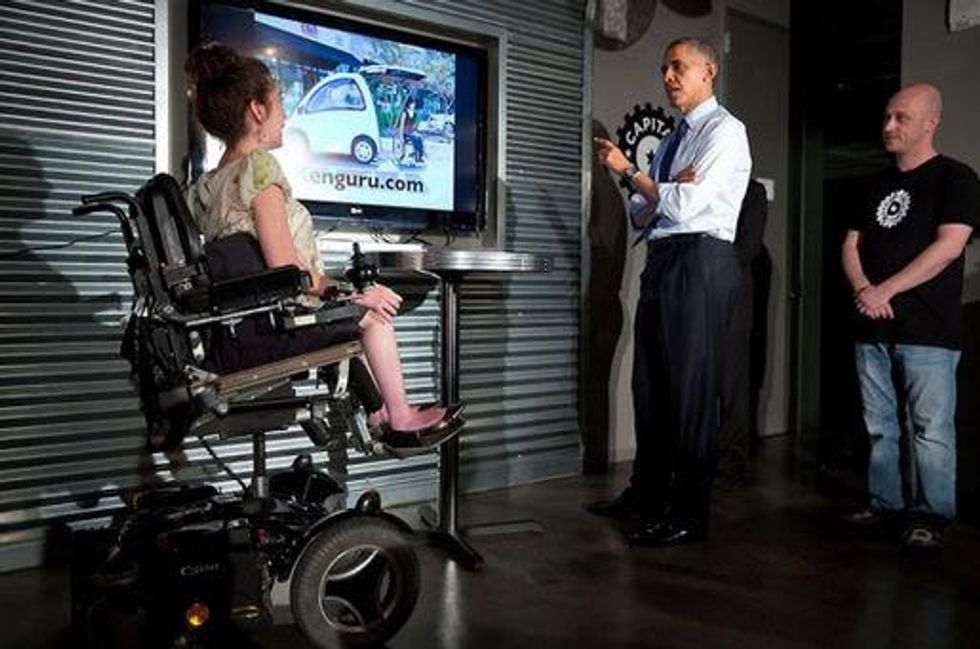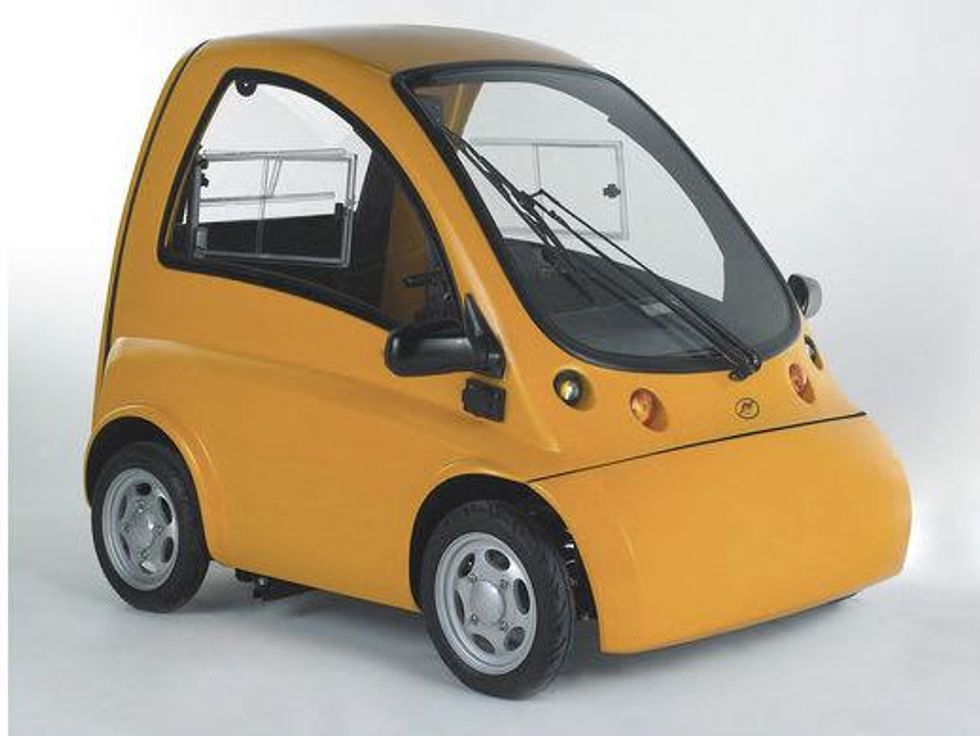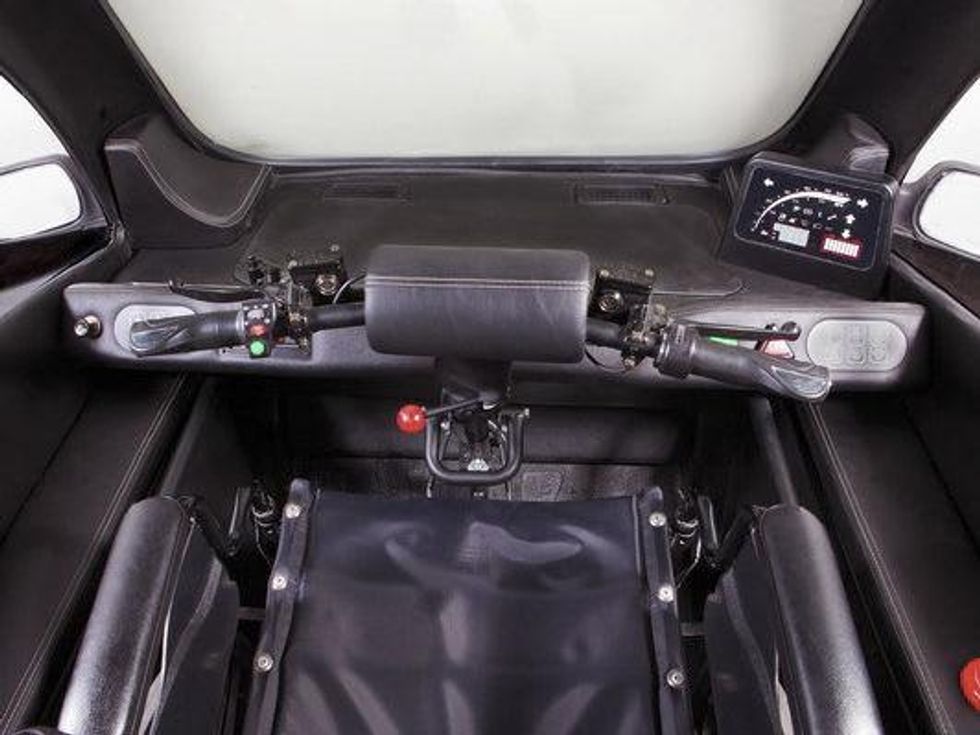Community Cars
Local entrepreneur produces first all-electric smart car for drivers in wheelchairs
“One of my main concerns was that I was going to pass out,” Stacy Zoern says jokingly. She and I are at a coffee shop in downtown Austin, and Zoern is giving me the scoop on meeting President Obama two weeks back.
“There was a moment when I thought it wasn’t going to happen,” Zoern admits. “Things had gotten off schedule, and I could feel the opportunity slipping though my fingers… but then I heard my name called.” Which was the signal to begin her three-minute speech in front of President Obama at Capital Factory, an entrepreneurial think-tank in Austin.
Zoern was at Capital Factory on May 9 to talk about her company, Community Cars, Inc., which aims to get folks who are physically disabled behind the wheel. Zoern credits her friend and Capital Factory founder Joshua Baer with getting her on the President’s agenda.
“I could tell that Obama got what I was saying by the way he was nodding,” Zoern recounts. “He told me, 'I look forward to seeing your cars out on the road.’ I couldn’t have gotten a bigger compliment."
The cars in question are Kenguru cars — the first all-electric smart cars built for drivers in wheelchairs. Community Cars plans to start producing the cars this summer.
“Every single facet of life is difficult when you have a disability,” Zoern tells me. “Transportation is a big [challenge]. It affects your ability to work, to have community involvement.” Zoern has faced that challenge all her life, having been wheelchair-bound since early childhood with a condition known as spinal muscular atrophy. She might one day be cruising in a bigger set of wheels, and I ask her to tell me more about the Kenguru car.
“Kenguru means ‘kangaroo’ in Hungarian,” Zoern explains. “Kangaroos get carried in a pouch, and this car is a little like that.” (Zoern acquired the assets for her company from a Hungarian entrepreneur back in 2010, hence the brand name.)
Zoern goes on to describe the car itself. “The Kenguru car is smaller than a smart car. There’s just enough room to fit a person in a wheelchair,” she says. “The back of the car opens up, and you roll in. You don’t even need to leave your wheelchair.” Zoern adds that all the controls in the Kenguru car are at hand-level, including the gas pedal and brake — much like a motorcycle. “So, to accelerate,” Zoern illustrates, “You just have to do this.” And she makes a little twisting motion with her left hand. She also tells me that the cost of the car is reasonable: around $20,000.
Though the Kenguru car has the potential to change the lives of individuals with physical disabilities, the production timeline for it is painfully slow, with only a handful of cars expected to ship from the factory in Florida this summer (most will be sent to Europe). Production will ramp up slowly, with the expectation that, a few years from now, Zoern’s company will manufacture several thousand Kenguru cars annually.
It’s worth noting that Zoern herself won’t be driving a Kenguru anytime soon. “I don’t have the upper body strength,” she says. But, she adds, by around 2015, Kenguru should have an additional car model in production. “That car will be controlled with something like a joystick.” In which case, Zoern could operate the vehicle.
While it’s clear that Zoern takes tremendous pride in tackling the transportation challenges of the physically disabled, she also acknowledges that she’s solving a small piece of a very large puzzle. “I can only speak from my own experience,” she says.
“I lead a pretty independent life — as much as I can. But I would have to characterize my experience as utter dependence on other people. That’s the simplest way of putting it. You can’t get out of bed on your own, or go to the toilet. You can’t get dressed on your own. And if you manage to kick off your shoes and decide you want to go out, you can’t put them back on.”
Those limitations haven't stopped Zoern from accomplishing an amazing amount. She earned a law degree from UT in 2005 in the hopes of becoming a disability advocate, but found the legal work trying (there was too much focus on things like wheelchair ramp codes — important stuff, Zoern tells me, but not personally appealing). So, she opted for a more lively pursuit: she became a disability entrepreneur.
She entered the business world back in 2010, after investigating transportation alternatives for herself. That year, Zoern came across a Hungarian company called Kenguru attempting to manufacture handicapped-accessible cars. The company was flailing, so she acquired Kenguru’s assets and partnered with its principal, fellow entrepreneur Istvan Kissaroslaki, to establish what is now her Austin-based company, Community Cars, Inc.
“One of the things I was trying to tell Obama is that there’s not support for entrepreneurs like me. Banks only lend money [to people who want to start a business] if they already have money. And I don’t run in wealthy circles! My partner and I had to max out our credit cards to do this. It was scary.”
Though there have been challenges, Zoern's visit with Obama, and the anticipated production of Kengurus, prove the entrepreneur is on her way to making life more accessible, and independence more tangible, for those with disabilities.



